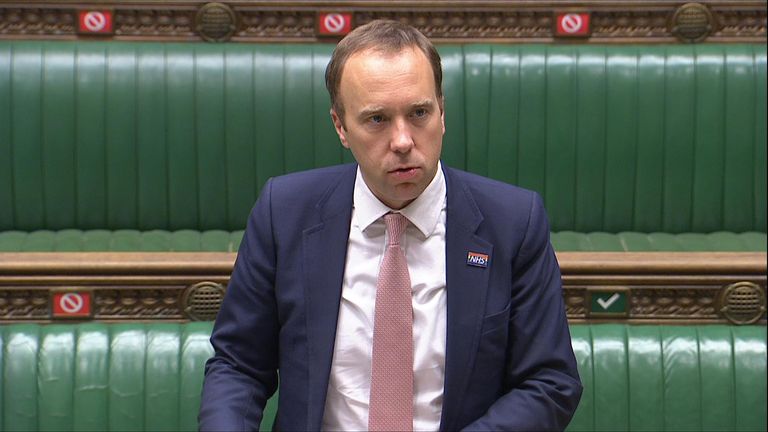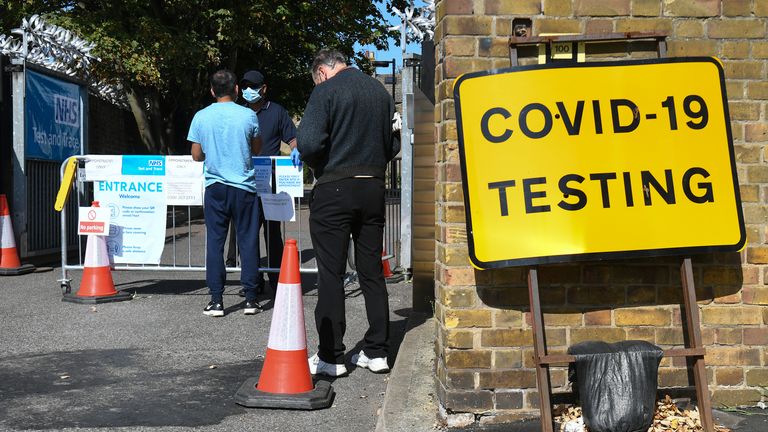Grandparents and others who provide informal childcare will be exempt from coronavirus rules in local lockdown areas in England, Health Secretary Matt Hancock has announced.
Speaking in the House of Commons on Monday, Mr Hancock acknowledged the “concerns” about the impact of local lockdowns on families’ childcare arrangements.
A series of new COVID-19 restrictions are due to come into force across many parts of England from Tuesday – including in the North West, Midlands and West Yorkshire.
Live coverage of the latest coronavirus news and updates
Local restrictions were last week imposed in the North East, meaning millions of people in England are already – or soon will be – living under local measures.
In most of these areas, people are being told they must not socialise with others outside of their own households, or support bubble, in private homes and gardens.
But there will now be an exemption for caring purposes, Mr Hancock told MPs.
“I’ve heard the concerns about the impact of local action on childcare arrangements,” he said.
“For many, informal childcare arrangements are a lifeline without which they couldn’t do their jobs.
“Today I’m able to announce a new exemption for looking after children under the age of 14, or vulnerable adults, where that is necessary for caring purposes.
“This covers both formal and informal arrangements.
“It does not allow for play dates or parties, but it does mean that a consistent childcare relationship that is vital for somebody to get to work is allowed.”
Mr Hancock added he hoped the change would provide “clarity and comfort to many people who are living with these local restrictions”.
The health secretary also used his statement to MPs to confirm how coronavirus tests are now being prioritised, after the government’s testing programme came in for heavy criticism amid widespread reports of shortages in many areas.
Ministers have pointed to rapidly increased demand for tests as being to blame for the problems.
Mr Hancock said tests would first be prioritised for hospital patients, second for care homes, third for NHS staff including GPs and pharmacists, fourth for targeted testing to manage and monitor outbreaks, fifth for teachers with COVID-19 symptoms, and then the general public with symptoms, while prioritising those in areas where there are more infections.
“The system relies on people coming forward for tests if and only if they have symptoms of coronavirus or have been specifically advised to by a health professional,” the health secretary told MPs.
:: Subscribe to Sophy Ridge on Sunday on Apple Podcasts, Google Podcasts, Spotify, Spreaker
Labour’s shadow health secretary Jonathan Ashworth told Mr Hancock that a “suppression strategy to drive infections down” was needed to “save lives, minimise harm and keep our children in school”.
He added: “None of us want to see another lockdown or ‘circuit break‘ but we understand if one becomes necessary.
“But test, trace and isolate should have been fixed. That failure has left us vulnerable and exposed.
“Now we must act with speed to save lives and minimise harm.”
Earlier on Monday, the government’s chief scientific adviser warned that the UK could see around 50,000 COVID-19 cases per day by the middle of October if current infection rates continue.
Sir Patrick Vallance, speaking at a televised address from Downing Street, said that such a situation could subsequently lead to 200 or more deaths per day by mid-November.
Professor Chris Whitty, England’s chief medical officer, told the public that the country should be braced for a tough winter, with colder weather expected to worsen the impact of coronavirus.
“We should see this as a six-month problem that we have to deal with collectively, it’s not indefinite,” he said.
Prime Minister Boris Johnson on Monday afternoon held calls with Scottish First Minister Nicola Sturgeon, Welsh First Minister Mark Drakeford, Northern Ireland’s First Minister Arlene Foster, and Northern Ireland’s Deputy First Minister Michelle O’Neill.
“During these calls, the prime minister made clear that the rising infection rates are a cause for great concern, which he is taking very seriously,” a Downing Street spokesperson said.
“He reiterated his unwavering commitment to working with the devolved administrations as we continue to tackle the virus.
“They all agreed to act with a united approach, as much as possible, in the days and weeks ahead.”
Mr Johnson will chair a meeting of the government’s emergency COBRA committee on Tuesday, as well as a meeting of his Cabinet, and make a statement to MPs in the House of Commons.
The prime minister spent the weekend with senior ministers and advisers discussing what steps should be taken next in the UK’s response to coronavirus.
On Friday, Mr Johnson admitted there was “a second wave coming in” and – asked about the prospect of further national restrictions to control the spread of COVID-19 – said that the government may need to “intensify things to help bring the rate of infections down”.
Amid unease among some Conservative MPs about the prospect of new national restrictions, senior backbencher Sir Edward Leigh warned in the Commons on Monday that public consent for lockdowns was “draining away”.




